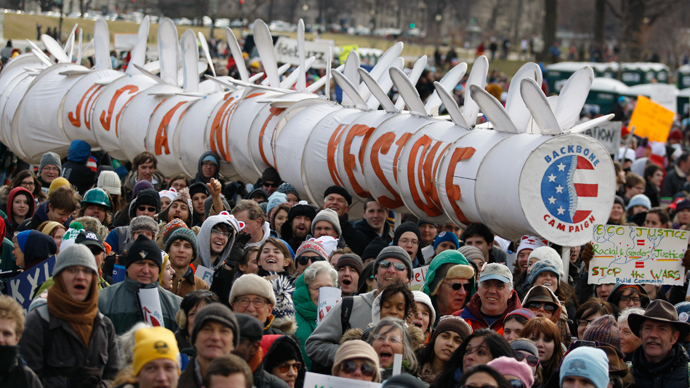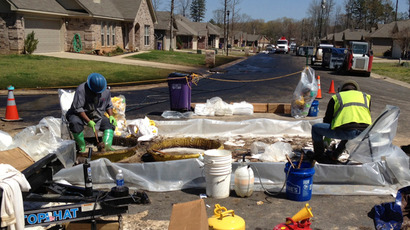Court backs continuation of Keystone XL pipeline in setback for opponents

A federal appeals court Wednesday backed a lower court’s decision to not temporarily halt construction of the southern end of the highly-contentious Keystone XL pipeline that will carry Canadian tar-sands oil from Oklahoma to Gulf Coast refineries.
Plaintiffs had sued the US Army Corps of Engineers, saying the
pipeline should not have been approved based on the steep
environmental dangers it poses.
The groups - including the Sierra Club, Clean Energy Future of
Oklahoma and the East Texas Sub Regional Planning Commission -
sought a pause on southern-end construction while the lawsuit was
being heard, though a district court blocked the request last
year.
The 10th US Circuit Court of Appeals upheld that ruling on
Wednesday, saying the groups could not prove the damaging
environmental impact the pipeline could have outweighed the
economic harm pipeline proponents would see if the project was
stopped.
The Obama administration is currently weighing whether to approve
a cross-border permit to TransCanada Corp. for its 2,000-plus
mile pipeline, which would move tar-sands oil through the US from
Alberta, Canada.
President Obama’s decision on the pipeline approval, however,
will likely come later than expected due to the government
shutdown.
A US State Department official told Reuters Thursday the amount
of furloughed government workers, especially in other agencies
that must consult with State, will almost certainly delay the
State Department’s review of the Keystone XL pipeline permit process.
The State Dept. was expected to issue a final environmental
review in mid-October. Though State has multi-year funding that
insulates its workers from furloughs, employees at the likes of
the Environmental Protection Agency and the Department of
Interior - agencies hit hard during the shutdown - must be
consulted in the review process.
The source could not quantify how long the delay could be.
"We cannot make any predictions on the timing - we haven't
before and can't now," the official said. "We are working
as best as we can under the circumstances" to complete the
review.
Once the State Department has done the review, eight other US
agencies will have 90 days to comment on the pipeline’s fate.
President Obama has final say on the project’s future, and he’s
hearing about it from proponents of the pipeline.
Powerful business interests sent Obama a letter Thursday, urging
him to approve the project based, at the very least, on investor
confidence as the US still struggles to recover from the economic
recession.
“We are at an inflection point in our economic recovery.
Whether economic growth will remain modest or pick up speed will
depend on maintaining investor confidence and strengthening
America’s competitiveness. The decision on Keystone XL will
affect both,” stated the letter from the Business Roundtable,
the Chamber of Commerce’s energy institute and the National
Association of Manufacturers.
“Investor confidence is shaped heavily by perceptions of
business climate — whether governments take actions that enable
capital investment and job growth,” adds the letter signed by
CEOs of corporate giants like Boeing, Cargill, Chevron, GE and
dozens more.
Potential environmental damage aside, the Keystone XL pipeline
has not been proven to be a boon for the US economy, based at
least on admissions by the State. Dept. and President Obama.
The State Department’s draft environmental impact statement
released in March estimates that the pipeline would create just
35 permanent jobs, though around 2,000 temporary jobs as the
pipeline is finished.
Furthermore, in July, Obama acknowledged the volatile tar-sands oil
- heavy crude oil embedded in a mixture of sand and clay that
requires energy-intensive extraction and refinery processes -
will not help lower US energy prices.
“[T]hat oil is going to be piped down to the Gulf to be sold
on the world oil markets, so it does not bring down gas prices
here in the United States,” he told the New York Times.
“In fact, it might actually cause some gas prices in the
Midwest to go up where currently they can’t ship some of that oil
to world markets.”














